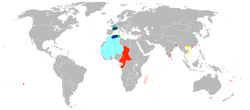Free France France libre (French) | |||||||||
|---|---|---|---|---|---|---|---|---|---|
| 1940–1944 | |||||||||
| Anthem: "La Marseillaise" (official) "Chant des Partisans" (unofficial)[1] ("Song of the Partisans") | |||||||||
 See map legend for color descriptions; sky blue = colonies under the control of Free France after Operation Torch | |||||||||
| Status | Government-in-exile (until November 1942) Provisional government over unoccupied and liberated territories (after November 1942) | ||||||||
| Capital | Paris (de jure) London (de facto) (until November 1942) Brazzaville (de jure and de facto) (1940-1942) Algiers (de facto) (after November 1942) | ||||||||
| Common languages | French, others | ||||||||
| Religion | Secular state | ||||||||
| Demonym(s) | French | ||||||||
| Chairman of National Committee | |||||||||
• 1940–1944 | Charles de Gaulle | ||||||||
| Historical era | World War II | ||||||||
| 18 June 1940 | |||||||||
| 11 July 1940 | |||||||||
| 24 September 1941 | |||||||||
| 3 June 1943 | |||||||||
| 8 February 1944 | |||||||||
| 3 June 1944 | |||||||||
| |||||||||
| History of France |
|---|
 |
| Timeline |
| Topics |
|
|
Free France (French: France libre) was a political entity claiming to be the legitimate government of France following the dissolution of the Third Republic during World War II. Led by General Charles de Gaulle, Free France was established as a government-in-exile in London in June 1940 after the Fall of France to Nazi Germany. It joined the Allied nations in fighting Axis forces with the Free French Forces (Forces françaises libres), supported the resistance in Nazi-occupied France, known as the French Forces of the Interior, and gained strategic footholds in several French colonies in Africa.
Following the defeat of the Third Republic by Nazi Germany, Marshal Philippe Pétain led efforts to negotiate an armistice and established a German puppet state known as Vichy France. Opposed to the idea of an armistice, de Gaulle fled to Britain and from there broadcast the Appeal of 18 June (Appel du 18 juin) exhorting the French people to resist the Nazis and join the Free French Forces. On 27 October 1940, the Empire Defense Council (Conseil de défense de l'Empire)—later the French National Committee (Comité national français or CNF)—formed to govern French territories in central Africa, Asia, and Oceania that had heeded the 18 June call.
Initially, with the exception of French possessions in the Pacific, India, and Equatorial Africa,[note 1] all the territories of the French colonial empire rejected de Gaulle's appeal and reaffirmed their loyalty to Marshall Pétain and the Vichy government.[2] It was only progressively, often with the decisive military intervention of the Allies, that Free France took over more Vichy possessions, securing the majority of colonies by November 1942.
The Free French fought both Axis and Vichy troops and served in almost every major campaign, from North Africa to Indochina. The Free French Navy operated as an auxiliary force to the Royal Navy and, in the North Atlantic, to the Royal Canadian Navy.[3] Free French units also served in the Royal Air Force, Soviet Air Force, and British SAS, before larger commands were established directly under the control of the government-in-exile. On 13 July 1942, "Free France" was officially renamed Fighting France (France combattante) to mark the struggle against the Axis both externally and within occupied France.
Exile officially ended after the reconquest of North Africa, when the Free French government relocated from London to Algiers.[note 2] From there, the French Committee of National Liberation (Comité français de Libération nationale, CFLN) was formed as the provisional government of all French, uniting the disparate forces that opposed the Axis and their collaborators. On 1 August 1943, Free French Forces united with the Army of Africa (L'Armée d'Afrique) to form the French Liberation Army (Armée française de la Libération, AFL). By June 1944, the AFL numbered more than 500,000, and the CFLN was succeeded by the Provisional Government of the French Republic (Gouvernement Provisoire de la République française, GPRF), which was established in anticipation of the liberation of France. The AFL participated in the Normandy landings and the invasion of southern France, ultimately leading the liberation of Paris in August 1944, which ushered in the provisional government on French soil.
The AFL took part in the Allied advance through France and subsequent invasion of Germany, and by end of the war totaled over 1.3 million troops—the fourth-largest Allied army in Europe. The provisional government ruled France until the establishment of the Fourth Republic in October 1946, having preempted the country's occupation by Allied forces and secured its status as a major power.
- ^ Dompnier, Nathalie (2001). "Entre La Marseillaise et Chant des Partisans quel hymne pour le régime de Vichy ?". In Chimènes, Myriam (ed.). La vie musicale sous Vichy. Histoire du temps présent (in French). Bruxelles: Éditions Complexe – IRPMF-CNRS, coll. p. 71. ISBN 978-2-87027-864-2.
- ^ French India, New Caledonia/New Hebrides and French Polynesia, were totally dependent economically and for their communication on British and Australian goodwill and support for Vichy was not a realistic option. Jean-Marc Regnault and Ismet Kurtovitch, "Les ralliements du Pacifique en 1940. Entre légende gaulliste, enjeux stratégiques mondiaux et rivalités Londres/Vichy", Revue d'histoire moderne et contemporaine, vol. 49, No. 4 (Oct. – Dec., 2002), p. 84–86
- ^ Stacey 2007, p. 373.
Cite error: There are <ref group=note> tags on this page, but the references will not show without a {{reflist|group=note}} template (see the help page).

